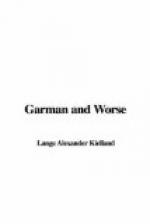From the highest and steepest point, on which the lighthouse was built, the coast made a slight curve to the southward, and at the other end of this curve was the large farm of Bratvold, which, with its numerous and closely packed buildings, appeared like a small village.
On the shore below the farm lay the little boat harbour, sheltered by a breakwater of heavy stone.
The harbour was commanded by the windows of the lighthouse, so that Madeleine could always keep her eye on Per’s boat, which was as familiar to her as their own sitting-room. This was a large and cheerful room, and into its corner was built the tower of the lighthouse itself, which was not higher than the rest of the building. The room had thus two windows, one of which looked out to sea, while from the other was a view to the northward over the sandy dunes, which were dotted with patches of heather and bent grass. In the sitting-room Madeleine’s father had his books and writing-table, and last, but not least, the large telescope. This was made to turn on its stand, so that it commanded both the view to the north and that out to sea. Here also Madeleine had her flowers and her work-table; and the tasteful furniture which Uncle Garman had ordered from Copenhagen, and which was always a miracle of cheapness to her father, gave the room a bright and comfortable appearance.
In the long evenings when the winter storms came driving in on the little lighthouse, father and daughter sat cosy and warm behind the shelter of their thick walls and closed shutters, while the light fell in regular and well-defined rays over the billows, which raged and foamed on the shore below. The ever-changing ocean, which washed under their very windows, seemed to give a freshness to their whole life, while its never-ceasing murmur mingled in their conversation and their laughter, and in her music.
Madeleine had inherited much of her father’s lively nature; but she had also a kind of impetuosity, which one of her governesses had called defiance. When she grew up she showed, therefore, the stronger nature of the two, and her father, as was his wont, gave way. He laughed at his little tyrant, whose great delight was to ruffle his thick curling hair. When, in his half-abstracted way, the old gentleman would tell her stones which threatened to end unpleasantly, she would scold him well; but when, from some cause or other, he was really displeased with her, it affected her so much that the impression remained for a long time. Her nature was bright and joyous, but she yearned for the sunshine, and when her father was out of spirits she could not help fancying that it was her fault, and became quite unhappy.
Madeleine had also her father’s eyes, dark and sparkling, but otherwise her only resemblance to him lay in her slight figure and graceful carriage. Her mouth was rather large, and her complexion somewhat dark. None could deny that she was an attractive girl, but no one would have called her pretty; some of the young men had even decided that she was plain.




